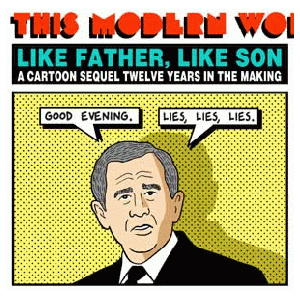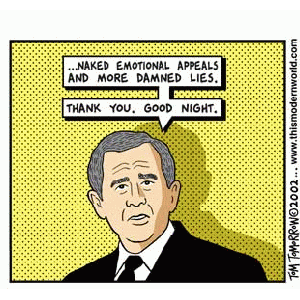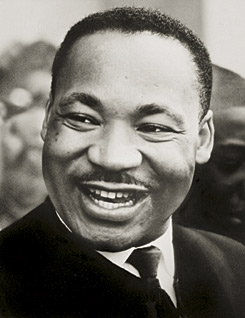Today (or tomorrow, if you’re not in the United States) is Buy Nothing Day
, a tradition (not a meme; there are no memes) from the folks at Adbusters. The idea is pretty simple: you’re not supposed to buy anything today. This is supposed to be an action against consumerism
. As it turns out, I made a completely unnecessary purchase today: a ticket to see The Incredibles for the third time, a big greasy bag of popcorn, and a big brand name Frozen Coke. Delicious, but oughtn’t I feel guilty?
No. I don’t feel guilty and I shouldn’t, because Buy Nothing Day is, in fact, a collosally misanthropic and subtly reactionary waste of time. Now, I couldn’t care less about the Adbusters crew, but there are people I respect (e.g., Elayne Riggs (2004-11-26), Mark Dilley (2004-11-19)) who support Buy Nothing Day and similar anti-consumerist
actions such as the Great Holiday Boycott. I can understand why good people think there is a good idea here: anti-consumerist
sentiments latch onto a real problem. But I dissent. Anti-consumerist
doctrine, from Marcuse to Adbusters, distorts the nature of the problem, analyses it in terms that are subtly (or sometimes not-so-subtly) misogynistic and classist, and offers solutions that systematically miss the point.
Buy Nothing Day
is as nice of an example of anti-consumerist
theory and practice as you could hope for. The problem is over-consumption of corporate-made goods; its source is consumers duped into mindless binging by clever ad-men; its solution is waking up and making the choice to opt out of the madness. (Here’s Adbusters: For 24 hours, millions of people around the world do not participate — in the doomsday economy, the marketing mind-games, and the frantic consumer-binge that’s become our culture. We pause. We make a small choice not to shop.
) You make the decision to opt out, and to chide others into opting out too–by shuffling around stores in a zombie costume or harassing retail workers, for example; that is the road to enlightenment, and enlightenment means liberation. This attack on consumer culture is packaged as resistance to the bourgeoisie; thus, anti-consumerism is sold as Leftist populism.
The problem is that this is wrong on nearly every count.
Stop for a moment to just look at what the theory of consumerism says about the origin of social problems–the delusions that the unwashed masses are allegedly duped into–and what it recommends as the solution–Gnostic liberation from the dirty material world. This is not Leftist critique; it is Romantic misanthropy. Look at how it is cashed out in action: ridiculing ordinary people going about their business by portraying them as mindless zombies, pigs, sheep, or cattle; harassing workers who have done nothing worse than show up for their jobs. This is not Leftist politics; it’s empty lifestylism and a display of personal purity. What it expresses is contempt and what it does is attack ordinary people–workers and women in particular. More on that in a moment. (I don’t want to suggest that everyone who recommends Buy Nothing Day or expresses anti-consumerist sentiments is some kind of slimy reactionary misanthrope. They aren’t; lots of decent and sensible people are involved. But I think those decent and sensible people are making an understandable mistake, and going along with a reactionary program without realizing it.)
Ellen Willis had it right in Women and the Myth of Consumerism (1969):
If white radicals are serious about revolution, they are going
to have to discard a lot of bullshit ideology created by and for
educated white middle-class males. A good example of what has to go
is the popular theory of consumerism.
As expounded by many leftist thinkers, notably Marcuse, this theory
maintains that consumers are psychically manipulated by the mass
media to crave more and more consumer goods, and thus power an
economy that depends on constantly expanding sales. …
First of all, there is nothing inherently wrong with consumption.
Shopping and consuming are enjoyable human activities and the
marketplace has been a center of social life for thousands of
years.
The locus of the oppression resides in the production function:
people have no control over which commodities are produced (or
services performed), in what amounts, under what conditions, or how
these commodities are distributed. Corporations make these
decisions and base them solely on profit potential.
As it is, the profusion of commodities is a genuine and powerful
compensation for oppression. It is a bribe, but like all bribes
it offers concrete benefits–in the average American’s case, a
degree of physical comfort unparalleled in history. Under present
conditions, people are preoccupied with consumer goods not because
they are brainwashed but because buying is the one pleasurable
activity not only permitted but actively encouraged by our rulers.
The pleasure of eating an ice cream cone may be minor compared to
the pleasure of meaningful, autonomous work, but the former is
easily available and the latter is not. A poor family would
undoubtedly rather have a decent apartment than a new TV, but since
they are unlikely to get the apartment, what is to be gained by
not buying the TV?
That’s not all, either. Misanthropy is always easiest to take out on the people who are least powerful and most widely denigrated; it shouldn’t be surprising that anti-consumerist
misanthropy is so often cashed out in backhanded attacks on poor workers, and especially on women:
The theory is said to be particularly applicable to women, for
women do most of the actual buying, their buying is often directly
related to their oppression (e.g. makeup, soap flakes), and they
are a special target of advertisers. According to this view, the
society defines women as consumers, and the purpose of the
prevailing media image of women as passive sexual objects is to
sell products. It follows that the beneficiaries of this
depreciation of women are not men but the corporate power
structure. …
The confusion between cause and effect is particularly apparent in
the consumerist analysis of women’s oppression. Women are not
manipulated by the media into being domestic servants and mindless
sexual decorations, the better to sell soap and hair spray. Rather,
the image reflects women as they are forced by men in a sexist
society to behave. Male supremacy is the oldest and most basic form
of class exploitation; it was not invented by a smart ad man. …
For women, buying and wearing clothes and beauty aids is not so
much consumption as work. One of a woman’s jobs in this society is
to be an attractive sexual object, and clothes and make up are
tools of the trade. Similarly, buying food and household
furnishings is a domestic task; it is the wife’s chore to pick out
the commodities that will be consumed by the whole family.
Appliances and cleaning materials are tools that faciliate her
domestic function. When a woman spends a lot of money and time
decorating her home or herself, or hunting down the latest in
vacuum cleaners, it is not idle self-indulgence (let alone the
result of psychic manipulation) but a healthy attempt to find
outlets for her creative energies within her circumscribed role.
… Consumerism as applied to women is blatantly sexist.
The pervasive image of the empty-headed female consumer constantly
trying her husband’s patience with her extravagant purchases
contributes to the myth of male superiority: we are incapable of
spending money rationally: all we need to make us happy is a new
hat now and then. (There is an analogous racial stereotype–the
black with his Cadillac and magenta shirts.) Furthermore, the
consumerism line allows Movement men to avoid recognizing that they
exploit women by attributing women’s oppression solely to
capitalism. It fits neatly into already existing radical theory and
concerns, saving the Movement the trouble of tackling the real
problems of women’s liberation. And it retards the struggle against
male supremacy by dividing women. Just as in the male movement,
the belief in consumerism encourages radical women to patronize and
put down other women for trying to survive as best they can,
and maintains individualist illusions.
In the past 35 years, we unfortunately haven’t come a long way. (Watch as women and girls are glibly portrayed as empty-headed, narcissistic, and shallow; marvel as unconsumer
boys thoughtlessly objectify liberated
women to pimp their project.)
So what must we do? Hey, it’s the holidays; let’s enjoy ourselves–even, yes, buy something, if we feel like it–and ignore or ridicule guilt-tripping anti-consumerists who haven’t got anything better to do than hector us. And when we get back to work, shouldn’t we remember that we’re all in this together, and that that the answer is to empower people instead of berating them? Here’s Ellen Willis again, sounding (alas!) eerily like she was writing about Buy Nothing Day itself, instead of the movement 35 years ago:
If we are to build a mass movement we must recognize that no
individual decision, like rejecting consumption, can liberate us.
We must stop arguing about whose life style is better (and secretly
believing ours is) and tend to the task of collectively fighting
our own oppression and the ways in which we oppress others. When we
create a political alternative to sexism, racism, and capitalism,
the consumer problem, if it is a problem, will take care of itself.





